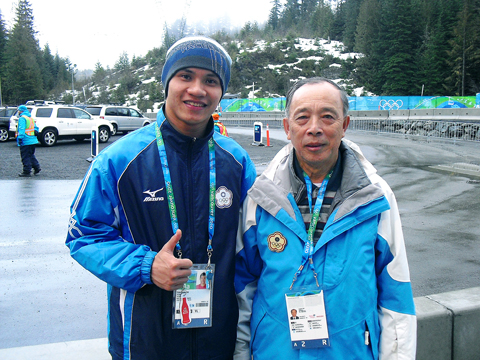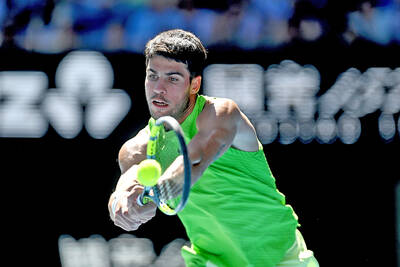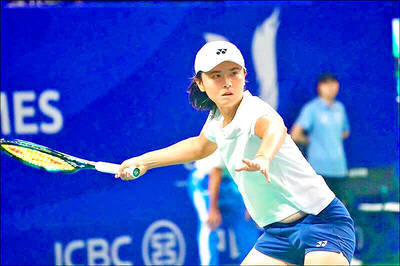Taipei Times: Why did you begin competing in this type of sport?
Ma Chih-hung (馬志鴻): Before I started [luge], I was in track and field, but then I took the chance to try something different, a different kind of sport. I discovered I really liked it and went in a different direction. I enjoy the challenge.
TT: Where do you train?

PHOTO: ERIC SHIH
Ma: All over Germany and Austria.
TT: Do you train alone?
Ma: I train with athletes from different countries. Many athletes have teammates from the same country, but I am on my own. But because of this, I find other athletes to train with and we sort of form a team to keep each other company.
TT: Where is your coach from?
Ma: My coach is from Romania.
TT: This is your second Olympic Games. Last time you competed in Turin, Italy. What do you think is the difference between the two Games?
Ma: Both the track and the track times were faster in Turin than in Vancouver.
TT: How about the difference in preparation between the Games?
Ma: This time, I’ve been able to prepare for a long time and practice a lot. I’ve used the experience [from before] to help me. I’m satisfied with the past two days of practice, so I should be okay with the competition.
TT: What are your goals?
Ma: Of course — to get a medal and be in the top three. But there are so many countries competing and all the best athletes are here. These are the Olympic Games. So my goal is to see if I can break my own personal best time; that would be my best honor. If I can work hard, I will be satisfied.
I hope that every run is smooth and I hope I won’t have an accident, that I won’t flip the sled and that I won’t crash. If I can do that, then I will beat my personal best.
TT: Where does your funding come from, the government?
Ma: Yes, some of the funding comes from Taiwan’s Olympic committee and some comes from the National Council for Physical Fitness and Sports. The rest comes from the Chinese Taipei Amateur Luge and Bobsleigh Association. It covers my training and living expenses.
TT: You are from Pingtung, which is a very hot place. It’s a very different environment from typical Winter Olympics conditions. How do you handle that?
Ma: The first time I saw snow, I had a great sense of anticipation. It felt very fresh, like being in a freezer. It was very exciting because it’s so different.
Adapting to the cold wasn’t easy at first, because of the big change, but gradually I was able to adjust and I was able to just concentrate on the sport. If I felt cold, then I would put on more clothes. It’s not something I pay attention to now, because I’ve adapted.
TT: A lot of Taiwanese aren’t familiar with your sport. Why were you able to succeed?
Ma: (laughs) In earlier Winter Olympics, Taiwan participated in more events. But now, because the Olympic standards are going up, the levels [required to qualify] are slowly getting higher. Taiwan’s participation in these sports is becoming less and less frequent, as it is not easy to qualify.
I feel that, as long as I have the opportunity [to compete], I will try. Of course, [luge] is not popular [in Taiwan]. People don’t pay attention to it. Still, seeking attention is not what it’s about for me, as I enjoy the sport for its own sake and I can use it to explore my abilities. But, of course, if everyone were more aware of the sport, that would be a great thing.
I am still hopeful that I can get support from everybody.
I think it’s important not to discriminate against certain sports. Don’t say a sport is not good because it’s not popular.
TT: Will you carry the Chinese Taipei Olympic flag?
Ma: I will carry the flag. [He was also the only athlete and the flag bearer at the Turin Olympics.]
TT: What are your feelings about that?
Ma: It’s a huge honor. But it’s only me [on the team] right now, so I hope other sports can qualify in the future. I hope by holding the flag, people will focus on our sports. I have to keep this going, so that [Taiwan] can compete in every [Winter] Olympics.
TT: Anything else?
Ma: Taiwan has broadcast rights this time. [This will] let the audience in Taiwan see sports that are uncommon. I am happy about this. Taiwanese will see a variety of sports and highlights that they don’t usually see.
Everyone can see me compete, which is my honor and also my responsibility. The Olympic broadcast is like public education: It could encourage more Taiwanese to participate [in winter sports], so that we won’t be absent from future Winter Olympics. It can also help give Taiwan more visibility. It could help improve physical education in Taiwan as well.

The Philadelphia 76ers, fueled by 36 points from Tyrese Maxey and a triple-double from Joel Embiid, on Thursday beat the Houston Rockets 128-122 in an NBA overtime thriller. Cameroonian big man Embiid scored 32 points, grabbed 15 rebounds and handed out 10 assists, posting the ninth triple-double of his career to help the Sixers end the Rockets’ three-game winning streak. Rockets star Kevin Durant scored 36 points and Amen Thompson added 17, but Thompson was scoreless in the fourth quarter. Even so, the Rockets led by nine midway through the final frame, Maxey tying it at 115-115 with 40.1 seconds left. Durant missed a

The Milwaukee Bucks’ Giannis Antetokounmpo on Friday said that he will probably be out for an extended period after hurting his right calf again after a similar injury caused him to miss eight games earlier this season. Antetokounmpo had his right calf wrapped in the first half of their 102-100 loss to the Denver Nuggets. He did not appear comfortable the rest of the night and left for good with 34 seconds remaining. “At the end, I could not move no more, so I had to stop playing,” Antetokounmpo said. The two-time NBA Most Valuable Player said he expected to undergo an MRI

Taiwanese FORTUNES: Wu Fang-hsien and Hsieh Su-wei both advanced to the last 16 of the women’s doubles, but Ray Ho was ousted in the men’s doubles Carlos Alcaraz yesterday stepped up his quest to win a maiden Australian Open as he overwhelmed showman Corentin Moutet to reach the last 16, while Taiwan’s Wu Fang-hsien and Hsieh Su-wei both advanced to the last 16 of the women’s doubles. Three-time finalist Daniil Medvedev battled through on day six at a warm and sunny Melbourne Park, as did Coco Gauff. Top seed Alcaraz was never in danger against French 32nd seed Moutet, easing through 6-2, 6-4, 6-1 at Rod Laver Arena in 2 hours, 5 minutes. It was the Spaniard’s 100th Grand Slam match and he boasts a remarkable 87-13 win-loss record,

LICENSE TO THRILL: Fans of Learner Tien, the youngest man to reach the quarter-finals in 11 years, wore ‘L Plates,’ signs for learning drivers, in support of the 20-year-old Taiwan’s Wu Fang-hsien and Japanese partner Eri Hozumi yesterday dominated eighth seeds Ellen Perez of Australia and the Netherlands’ Demi Schuurs to advance to the Australian Open quarter-finals, the furthest the Taiwanese has made it since her first appearance in Melbourne in 2020. Wu and Hozumi overpowered world No. 21 Perez and world No. 20 Schuurs 6-2, 6-2 in 1 hour, 11 minutes at 1573 Arena in much cooled temperatures since Saturday’s blazing 40°C disrupted play. World No. 34 Wu has now made it further in the Australian Open since she was knocked out in the third round in 2024. The Taiwanese-Japanese duo